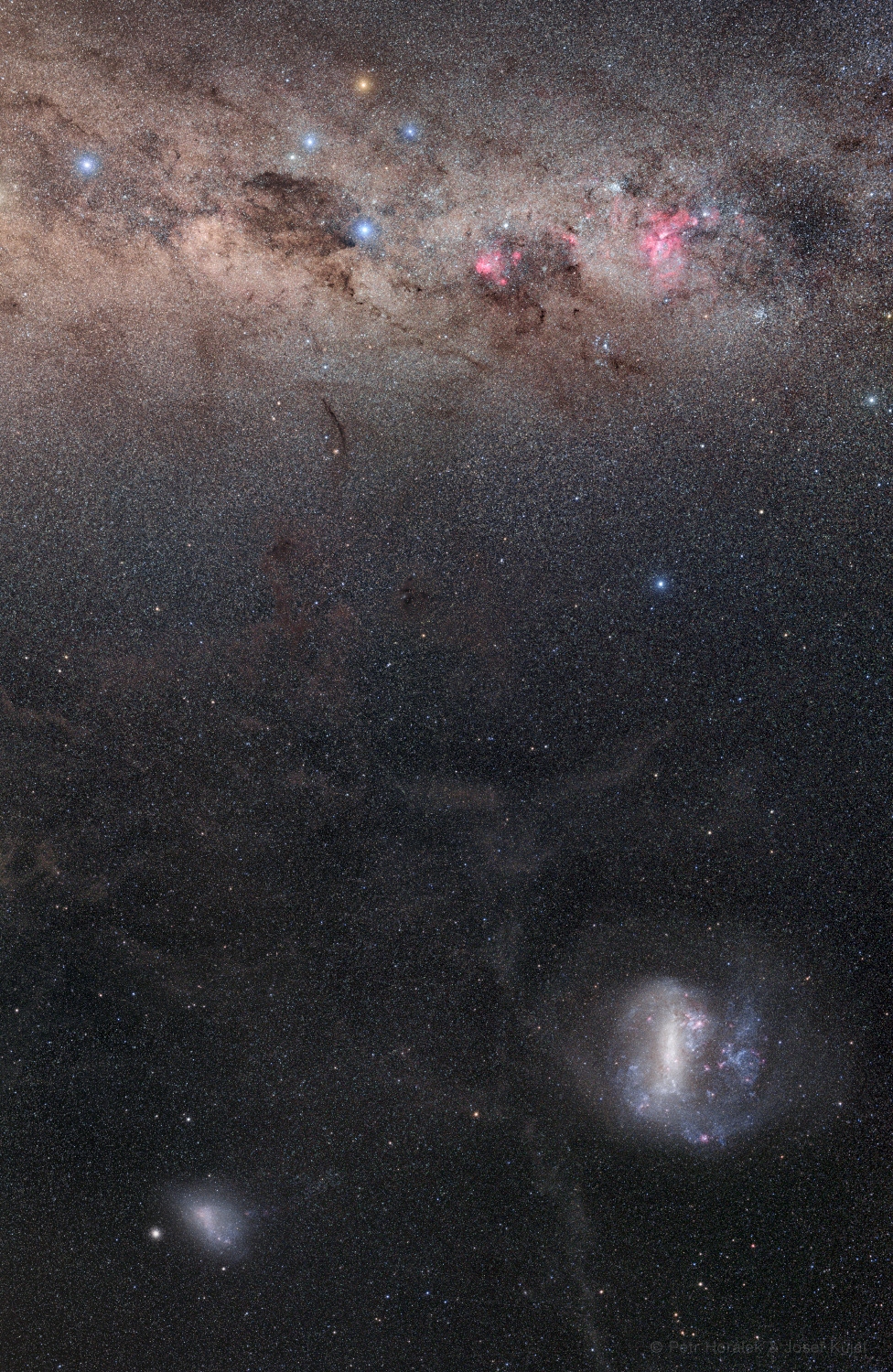Blog
mick will perform his Roots version of I Fought the Law/Dirty Old Town and a Wailing Souls tune

The South Celestial Pole is easy to spot in star trail images of the southern sky. The extension of Earth’s axis of rotation to the south, it’s at the center of all the southern star trail arcs. In this starry panoramastreching about 60 degrees across deep southern skies the South Celestial Pole is somewhere near the middle though, flanked by bright galaxies and southern celestial gems. Across the top of the frame are the stars and nebulae along the plane of our own Milky Way Galaxy. Gamma Crucis, a yellowish giant star heads the Southern Cross near top center, with the dark expanse of the Coalsack nebula tucked under the cross arm on the left. Eta Carinae and the reddish glow of the Great Carina Nebula shine along the galactic plane near the right edge. At the bottom are the Large and Small Magellanic clouds, external galaxies in their own right and satellites of the mighty Milky Way. A line from Gamma Crucis through the blue star at the bottom of the southern cross, Alpha Crucis, points toward the South Celestial Pole, but where exactly is it? Just look for south pole star Sigma Octantis. Analog to Polaris the north pole star, Sigma Octantis is little over one degree fom the the South Celestial pole.

more...
January 1 1985
Guinean Kora virtuoso, singer and composer, Sekou Kouyate, who invented the electrified kora at the age of 12 – and went on to pioneer the sound with fast riffs, experimental distortions and rock and reggae-influenced playing.
His family band, Section Kora, impressed audiences and the press on their recent successful tours Scandinavia and Mexico – and they recorded this album during visits to Copenhagen in 2014 and 2015, with the guest star, Francis Kweku Osei for Ghana. Some of the songs are performed entirely by the multi instrumentalist Sekou Kouyate.
Omar Hakim (born February 12, 1959) is an American jazz, jazz fusion and pop music drummer, producer, arranger and composer. He has worked with Weather Report, David Bowie, Foo Fighters, Sting, Madonna, Dire Straits, Journey, Kate Bush, George Benson, Miles Davis, Daft Punk, Mariah Carey, and Celine Dion.
Hakim was born in New York City on February 12, 1959. His father, Hasaan Hakim, was a trombonist. Omar started playing the drums at the age of five, and first performed in his father’s band four or five years later.
Hakim first came to major attention backing Carly Simon in 1980, and joined Weather Report in 1982. He played drums on David Bowie‘s 1983 album Let’s Dance, as well as the follow-up, Tonight, in 1984. Bowie described Hakim as “a fascinating drummer, with impeccable timing” and “always fresh in his approach”.
In the mid-1980s, Hakim joined Dire Straits as drummer while recording their fifth album Brothers in Arms. Hakim temporarily replaced the band’s then-permanent drummer Terry Williams, when his performance was felt to be unsuitable for the desired sound of the album after most of the album tracks had been recorded. Hakim re-recorded all the drum tracks on the album in two days and then left for other commitments. Hakim and Williams are both credited on the album. Hakim was also part of the band for Sting‘s album The Dream of the Blue Turtles.
more...Seydou Koné (French pronunciation: [sɛdu kɔne]; born January 1, 1953 in Dimbokro, N’Zi Region), better known by his stage name Alpha Blondy, is an Ivorian reggae singer and international recording artist. Many of his songs are politically and socially motivated, and are mainly sung in his native language of Dioula, French and in English, though he occasionally uses other languages, for example, Arabic or Hebrew.
After various TV shows for Kassi, Blondy recorded his first solo album in 1982, entitled Jah Glory. This album was to have enormous success and would become later a symbol of resistance because of the song “Brigadier Sabari,” which documents his experience of being arrested in Abidjan in the 1980s and his subsequent mistreatment by the police. Alpha Blondy became a big star in Abidjan with his African twist of Reggae music, becoming in the eyes of his fans “the Bob Marley of Africa”. Alpha Blondy is spiritual, political and positive just like Marley himself, and recorded a cover of Bob Marley’s song “War“. In order to reach more people with his message, he chose to sing in many languages: English; French; Baoulé, and his native language – Dioula.Later, he also brought new instrumentation to his brand of reggae such as the violin and cello.
Soon, the fame of Alpha Blondy spread to Europe. Following the success of an EP entitled Rasta Poué, he went to Paris in 1984 to make his second album, Cocody Rock, with the label Pathe Marconi. The “Bob Marley of Africa” travelled to the island of Jamaica and recorded the title track of this album with Marley’s backing group, The Wailers.
Back home in 1985, Blondy went into the studio to record “Apartheid is Nazism“, a call for the end of apartheid. In 1986, he recorded “Jerusalem” at Tuff Gong studios in Jamaica, again with The Wailers featuring legendary Aston “Family Man” Barrett. Blondy tried to promote unity between the religion of Islam, Judaism and Christianity. He drew his arguments and inspiration from his own diverse knowledge of the Bible, the Quran, and the Torah. That same year, he sang in Hebrew during a concert in Morocco. At this point, he was continuously touring. His new album Revolutionhad a lighter, gentler sound; this album featured cellos in the instrumentation, and the line-up included veteran Ivory Coast singer Aicha Kone. The album also included “Jah Houphouët parle”, a long speech by Ivory Coast president Félix Houphouët-Boigny with only the most minimal beat behind it.
more...Joseph Allen “Country Joe” McDonald (born January 1, 1942) is an American musician who was the lead singer of the 1960s psychedelic rockgroup Country Joe and the Fish.[
McDonald was born in Washington, D.C., and grew up in El Monte, California, where he was student conductor and president of his high school marching band. At the age of 17, he enlisted in the United States Navy for three years and was stationed in Japan. After his enlistment, he attended Los Angeles City College for a year. In the early 1960s, he began busking on Telegraph Avenue in Berkeley, California. His father, Worden McDonald, from Oklahoma, was of Scottish Presbyterian heritage (the son of a minister) and worked for a telephone company. His mother, Florence Plotnick, was the daughter of Russian Jewish immigrants and served for many years on the Berkeley City Council. In their youth, both were Communist Party members before renouncing the cause, and named their son after Joseph Stalin.
McDonald has recorded 33 albums and has written hundreds of songs over a career spanning 60 years. In 1965, he and Barry Melton co-founded Country Joe & the Fish which became a pioneer psychedelic rock band with their eclectic performances at the Avalon Ballroom, the FillmoreAuditorium, the 1967 Monterey Pop Festival, and both the 1969 original and 1979 reunion Woodstock Festivals.
more...Milton “Bags” Jackson (January 1, 1923 – October 9, 1999) was an American jazz vibraphonist, usually thought of as a bebop player, although he performed in several jazz idioms. He is especially remembered for his cool swinging solos as a member of the Modern Jazz Quartet and his penchant for collaborating with hard bop and post-bop players.
A very expressive player, Jackson differentiated himself from other vibraphonists in his attention to variations on harmonics and rhythm. He was particularly fond of the twelve-bar blues at slow tempos. He preferred to set the vibraphone‘s oscillator to a low 3.3 revolutions per second (as opposed to Lionel Hampton‘s speed of 10 revolutions per second) for a more subtle tremolo. On occasion, Jackson sang and played piano professionally.
Jackson was born on January 1, 1923 in Detroit, Michigan, United States, the son of Manley Jackson and Lillie Beaty Jackson. Like many, he was surrounded by music from an early age, particularly that of religious meetings: “Everyone wants to know where I got that funky style. Well, it came from church. The music I heard was open, relaxed, impromptu soul music” (quoted in Nat Hentoff’s liner notes to Plenty, Plenty Soul). He started on guitar when he was seven, then on piano at 11.
more...Cederblad 51 is a reflection nebula, which appears divided in two by a cloud of dust in the foreground. Nearby there are some Herbig-Haro objects, indicating recent star formation. Ced 51 is embedded in the large emission nebula GN 05.30.0. Cederblad 51 is a part of the large Sh2-264 nebula, nicknamed the “Orion’s head”. Meissa is at about 2.5° to the South. Three main colors are represented: red of the large H-alpha emission nebula (catalog name: GN 05.30.0), blue of the reflection nebulae (they are the Ced 51) and brown of the dust nebulae (many dark nebulae such as: LDN1574, 1577, 1580, 1581, 1597).
Total exposure is quite short due to veils and do not include a separate H-alpha exposure, so it can be improved much. I keep in the to do list!
James Robert Haslip (born December 31, 1951) is an American bass guitarist who was a founding former member of the jazz fusion group the Yellowjackets. He was also an early user of the five-string electric bass.
Born in the Bronx to Puerto Rican immigrants, Spanish was Haslip’s first language and he learned to speak English in kindergarten. His father, James Joseph (Jaime) Haslip (1915–1999) served in the United States Customs Service, beginning as a Merchant Marine until moving to patrolman and eventually deputy commissioner, marrying Jimmy’s mother Virginia (Viera) Haslip (1912-2009) in 1937.
Haslip moved to Huntington, New York when he was four years old. At age seven, he began playing drums and then moved onto other instruments such as trumpet and tuba until playing bass at age 15. Although he took music lessons and went to a private music school, he considers himself self-taught. He has said that he went to a local music shop with his father and purchased a right-handed bass (he is left-handed) and learned to play it upside down.
more...Odetta Holmes (December 31, 1930 – December 2, 2008), known as Odetta, was an American singer, actress, guitarist, lyricist, and a civil and human rights activist, often referred to as “The Voice of the Civil Rights Movement”. Her musical repertoire consisted largely of American folk music, blues, jazz, and spirituals. An important figure in the American folk music revival of the 1950s and 1960s, she influenced many of the key figures of the folk-revival of that time, including Bob Dylan, Joan Baez, Mavis Staples, and Janis Joplin. Time magazine included her recording of “Take This Hammer” on its list of the 100 Greatest Popular Songs, stating that “Rosa Parks was her No. 1 fan, and Martin Luther King Jr. called her the queen of American folk music.”
Odetta was born Odetta Holmes in Birmingham, Alabama, on December 31, 1930. Her father, Reuben Holmes, had died when she was young, and in 1937 she and her mother, Flora Sanders, moved to Los Angeles. When Flora re-married a man called Zadock Felious, Odetta took her stepfather’s last name.
more...Jonah Jones (born Robert Elliott Jones; December 31, 1909 – April 30, 2000) was a jazz trumpeter who created concise versions of jazz and swingand jazz standards that appealed to a mass audience. In the jazz community, he is known for his work with Stuff Smith. He was sometimes referred to as “King Louis II,” a reference to Louis Armstrong. Jones started playing alto saxophone at the age of 12 in the Booker T. Washington Community Center band in Louisville, Kentucky, before quickly transitioning to trumpet, where he excelled.
Jones was born in Louisville, Kentucky. Jones began his career playing on a river boat named Island Queen, which traveled between Kentucky and Ohio. He began in the 1920s playing on Mississippi riverboats and then in 1928 he joined with Horace Henderson. Later he worked with Jimmie Lunceford and had an early collaboration with Stuff Smith in 1932. From 1932 to 1936 he had a successful collaboration with Smith, but in the 1940s he worked in big bands like Benny Carter‘s and Fletcher Henderson‘s. He would spend most of a decade with Cab Calloway‘s band which later became a combo.
https://www.youtube.com/watch?v=GHUIl63bQHo&t=9s
more...John Kirby (December 31, 1908 – June 14, 1952), was a jazz double-bassist who also played trombone and tuba. In addition to sideman work (prominently with Benny Goodman), Kirby is remembered for leading a successful chamber jazz sextet in the late 1930s and early 1940s, which scored several hit songs including “Loch Lomond” and the debut recording of “Undecided“, a jazz standard.
John Kirby was born John Kirk in Winchester, Virginia on 31 December 1908. His mother, Dolly Kirk (died October 1925) gave him up for adoption and he was raised at 442 North Kent Street by Reverend Washington Johnson and his wife, Nancy. Kirby was a student at the Winchester Colored School (renamed Douglass School in 1916) and started trombone lessons around 1917 under the guidance of Professor Powell Gibson (principal, math, drama and music teacher). Kirby (after success in New York), stated that Bach‘s work fascinated him as a kid and that he learned to play music just as it was written.
more...More Posts
- Terry Bozzio
- Tracy Nelson
- T. S. Monk
- World Music Trio Mandili
- Daily Roots Uniques
- Happy Kwanzaa 2023
- Cosmos NGC 1356, LEDA 467699, LEDA 95415 & IC1947
- Doug Hammond
- John Scofield
- Billy Bean
- World Music Steel Drum Island
- Daily Roots Michael Fitzroy
- Pray for Peace this Christmas Day 2023
- Cosmos NGC 2264
- Annie Lennox
- Don Pullen
- Oscar Moore
- Cab Calloway
- World Music Jam Mahibathi
- Daily Roots Bob Marley
